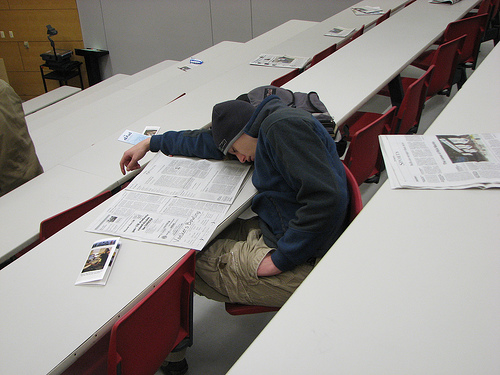10 Tips to Good Grades
Some things, like going to class, seem obvious. But there is a huge temptation to skip class in college. There’s a lot of other things to do that you might find more interesting than, say, “density functional theory.” Unlike high school, many college classes don’t take attendance. And if you’re living away from home, your parents aren’t there to make sure you get to class.

Photo by rofltosh.
Some students figure they can just read the book and they’ll get by. Nothing could be further from the truth. In fact, talk to any college graduate on the day they’re getting their diploma and they’ll tell you the most important thing that propelled them to graduation day was going to class.
Just being smart got you through high school. It won’t get you through college. It will take a little more work. OK, probably, a lot more work. It all starts with class. Here is a 10 point to-do list about college classes.
- Don’t skip class. If you do, you won’t know what the professor is emphasizing. In most cases, your professor will provide you with analysis and interpretation of the subject that you won’t find in the assigned reading. Take special note of any guest speakers the professor brings to class because that information is likely to be on a future test.
- You can’t just show up for class. You have to be mentally prepared. That means you’ve eaten. You have had enough sleep. If you’re not mentally sharp, chances are you’re going to miss something important during the lecture.
- Make sure you read the reading assignments prior to each class. That way the lectures will make a lot more sense. Chances are you won’t understand everything in the reading assignments. That’s OK. There’s a good chance that you will understand it after the lecture. If you don’t, meet with your professor as soon as possible. The course syllabus will tell you what the reading assignment is for each class. It may also list the test schedule. The syllabus is your bible. Don’t lose it. Refer to it often.
- Sit toward the front and center of the class. You’ll be able to focus more on what the professor says and there will be fewer distractions. If you sit way in back, it may be difficult to read what the professor is writing on the board or clearly hear what the professor is saying.
- Do not email or text during class. Obviously, don’t make or take phone calls. Those types of distractions will cause you to miss something the professor is saying.
- Be ready to take notes. That too may seem obvious. But if you’re leaning back in your chair like you’re watching a TV show, you’re really not ready. Think about how baseball players in the field position themselves when the pitcher throws the ball. Are they standing up straight? Do they have their hands on their hips? Are they looking at who’s sitting in the stands? No. They’re in a semi-crouch with their hands forward intently looking at the batter and the ball. They’re ready to catch anything that comes their way. That’s exactly how you need to be positioned in your seat, ready to catch any information the professor throws your way. So, your feet are on the floor, not propped up on the seat in front of you. You’re not slouched, but sitting up straight, even leaning forward a bit, pen or pencil in hand, ready for anything. Physically positioning yourself cues the brain to be alert.
- Don’t try to write down every word the professor says. Instead, listen for key words and phrases. These might include: “In summary,” “the three key points are,” “the crucial passage here is.” Try to capture that information and the themes of the class.
- Re-write your class notes within 24 hours of the lecture. Learning involves repetition. Rewriting your notes is a key part of the learning process that will put the information in long term memory. That will also help prepare you for the next class. If your professor posts the text or notes of his/her lecture on-line, read them and save them. Compare them to your notes.
- Meet with your professor early in the semester or quarter. Try to establish a relationship so that you’re not just another face in the crowd. If there’s something you don’t understand, be specific. Don’t just say, “I don’t get this.”
- Form a study group of 3 to 5 people in the class. It’s a great way to get different “takes” on what the professor is saying and will help you prepare for tests.
There’s lot more to do including how to take notes and how to prepare for tests. When it comes to notes, Google “Cornell Note Taking.” It’s a terrific system for taking and organizing notes.
John Spiropoulos is a 3 time Emmy award winning TV news reporter who whose website is devoted to the success of college freshmen.






